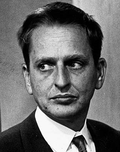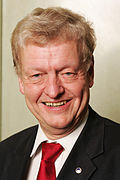| Minister for Education | |
|---|---|
| Statsråd och chef för utbildningsdepartmentet | |
 | |
| Ministry of Education and Research | |
| Member of | The Government |
| Seat | Stockholm, Sweden |
| Appointer | The Prime Minister |
| Term length | No fixed term Serves as long as the incumbent doesn’t have majority support in the Riksdag or support from the Prime Minister |
| Precursor | Minister of Education and Ecclesiastical Affairs |
| Formation | 1 January 1968 (as Minister for Education) 6 June 1974 (as Councilor of State and Head of the Ministry of Education and Research) |
| First holder | Olof Palme |
| Website | |
The Minister for Education (Swedish : utbildningsminister) is the education minister of Sweden and the head of the Ministry of Education and Research.
Contents
The current minister for education is Simona Mohamsson of the Liberals.















